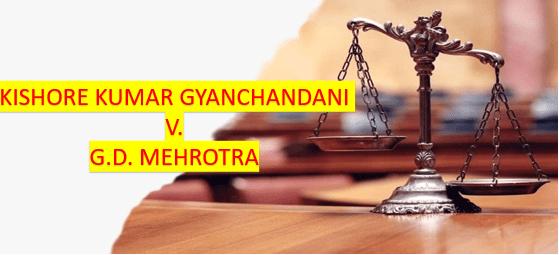
KISHORE KUMAR GYANCHANDANI V. G.D. MEHROTRA
| Appellant | Kishore Kumar Gyanchandani |
| Respondent | G.D. Mehrotra |
| Date of Judgement | 28th February 2001 |
| Court | Supreme Court of India |
| Citation | AIR 2002 SC 483 |
| Bench | G. Pattanaik, S.Phukar, B. Agarwal |
FACTS OF THE CASE:-
- On 15th September 1995 a FIR was logged against the respondent because of rash driving (section 279 of IPC) and causing grievous hurt to human life by performing such rush activities (section 338 of IPC).
- Then the police conducted an investigation and then filed a charge sheet / final form with the court.
- The appellant filed a protest petition as a complaint with the court after submitting the final report.
- Then the respondent who brought the case after the submission of the final report asked the High Court to dismiss it.
- The order taking cognisance and issuing the procedure in the complaint/ appellant proceeding was annulled by the High Court in the contested ruling.
- On 27th January 1996 magistrate sent a notice to the appellant and the appellant did not raise any objection; this was before accepting the final form by the Magistrate. But according to the appellant he never received any notice from the court.
- Now the appellant has filed an appeal with the Supreme Court under section 202 of Cr.P.C to challenge the High Court’s decision.
ISSUE OF THE CASE:-
Can a complaint file any complain after the final form is submitted under section 202 of CrPC?
SECTIONS USED IN THIS CASE:-
- SECTION 279 IPC- Deals with rash driving or riding on a public way
- SECTION 338 IPC- It states about grievous hurt to an individual while performing an act so rashly that it endangers human life..
- SECTION 156 CrPC- The police officer can start the investigation of any cognizable case and need not wait for the order of the magistrate.
- SECTION 173 CrPC- It states about the charge sheet or the final report given to the court after completion of the investigation by a police officer.
- SECTION 190 CrPC- It states about taking cognizance of offence by Magistrate either from a complaint, FIR or through information received.
- SECTION 201 CrPC- It is the procedure for the Magistrate who is not competent to take the case. He shall return the presentation of the case if it is in writing or direct the complaint to the proper court.
- SECTION 202 CrPC- Postponement of issue process, the Magistrate may feel there are no sufficient grounds to continue the proceedings. So either he will inquire the
Case himself or direct investigation by police.
JUDGEMENT OF THE CASE:-
- This matter was taken before a two judge’s bench but there were some separate views. So then the case was referred to a 3 judge’s bench. The main issue in the present case is the complaint lodged by the complainant after the police had presented the final results of the investigation.
- The complainant’s representative referred to Gopal Vijay Verma v. Bhuneshwar Prasad Sinha that acceptance of the final form did not deprive the judge of the opportunity to see the documents presented in the appeal process.
- Police, following an investigation under Section 173 of the Cr.P.C. submitted a final form. If the magistrate accepts the final form provided by the police, the plaintiff’s right to file an ordinary complaint does not expire, but on the contrary, once this complaint has been filed, the magistrate follows what is set out in section 201 of Cr.P.C and reads the documents provided by the complainant that certify the violation.
- The respondent’s representative referred to the case of Abhinandan Jha and others v. the State of Bihar in that case, the court said that after accepting the final form, the judge could not order the investigating authority’s file of the complaint. However, the judge has separate powers to direct the investigative agency to further investigate a case and even hear it based on the evidence presented, even when the police may have filed a final form.
- After going through all the arguments the Supreme Court came to a conclusion and allowed the complainant to file an appeal under section 202 of Cr.P.C.
Hence if the charge sheet is filed it cannot prohibit the magistrate from taking the complaint filed by the appellant.
written by, Amrita Priyadarshini, Birla Global University




0 Comments